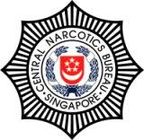Central Narcotics Bureau
| Central Narcotics Bureau | |
|---|---|
| Abbreviation | CNB |

Logo of the Central Narcotics Bureau
|
|
| Agency overview | |
| Legal personality | Governmental: Government agency |
| Jurisdictional structure | |
| National agency | Singapore |
| General nature | |
| Operational structure | |
| Elected officers responsible |
|
| Agency executives |
|
| Parent agency | Ministry of Home Affairs |
| Operational Divisions |
4
|
| Staff Divisions/Units |
7
|
| Website | |
| http://www.cnb.gov.sg/ | |
| Special Task Force | |
|---|---|
| Active | 1997 – Present |
| Country |
|
| Branch | Central Narcotics Bureau |
| Type | Special Forces |
| Role | Domestic Law Enforcement |
| Size | Classified |
| Garrison/HQ | Classified |
| Nickname(s) | STF |
| Commanders | |
| Current commander |
Classified |
The Central Narcotics Bureau (CNB, Chinese: 肅毒局), established in 1971, is the primary drug enforcement agency in Singapore responsible for coordinating all matters pertaining to drug eradication.
On 19 October 1971, the Government of Singapore announced that a new and dedicated Central Narcotics Bureau (CNB), would be set up within the Ministry of Home Affairs to fight the drug menace. Minister for Home Affairs (1970 – 1972) Wong Lin Ken said, "Such activities will be coordinated in the Central Narcotics Bureau. CNB also plans to build a capacity to educate the public in the dangers of drug abuse".
In 1973, Singapore's government introduced the Misuse of Drugs Act (MDA)15 to deal with drug traffickers, pushers and addicts. The enactment of the MDA was intended to firstly consolidate the provisions of the Dangerous Drugs Ordinance 1951 (DDO) and Drugs (Prevention of Misuse) Act 1969 (DPMA), and secondly to more effectively deal with the worsening drug situation. New legislation was perceived to be necessary by then Minister for Health and Home Affairs Chua Sian Chin in Parliament in 1973. "The Dangerous Drugs Act (i.e DDO) was enacted about 21 years ago and the controls provided therein are grossly inadequate for the 70's, with the introduction of a host of new drugs of medical value if properly used." The need was exacerbated by Singapore's geographical location and development into a trading hub. The proximity to the Golden Triangle is another oft-cited justification for tough anti-drug laws.
In November 1993, the "Committee to Improve the Drug Situation in Singapore" was set up to look into the drug situation and it recommended a total and integrated approach to deal with the drug problem. The four main anti-drug strategies are Preventive Drug Education, Rigorous Enforcement, Treatment and Rehabilitation for addicts, and Aftercare and Continued Rehabilitation for ex-addicts to reintegrate them into society. CNB looks after rigorous enforcement and preventive drug education.
Drug trafficking is commonly known in the republic as a criminal offence punishable by hanging, which is enforced under Schedule 2 of the Misuse of Drugs Act, any person importing, exporting, or found in possession of more than the threshold quantities of illegal drugs receives a mandatory death sentence. The Government of Singapore is famous for educating the public by example of high profile cases such as the capital punishment of drug traffickers Van Tuong Nguyen and Shanmugam Murugesu.
...
Wikipedia
